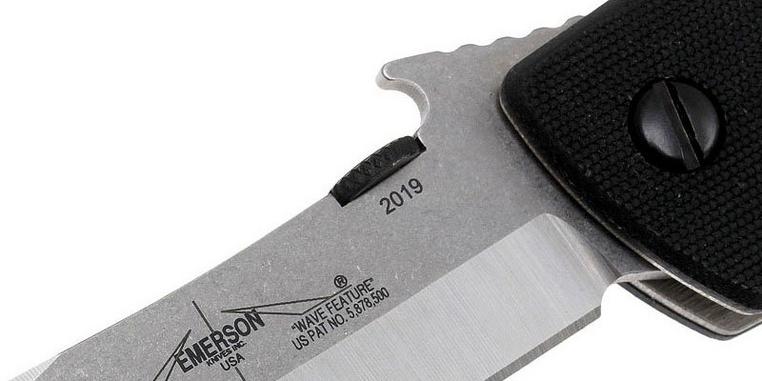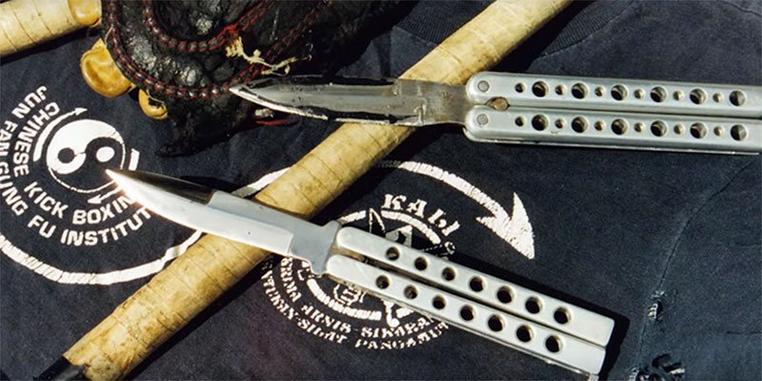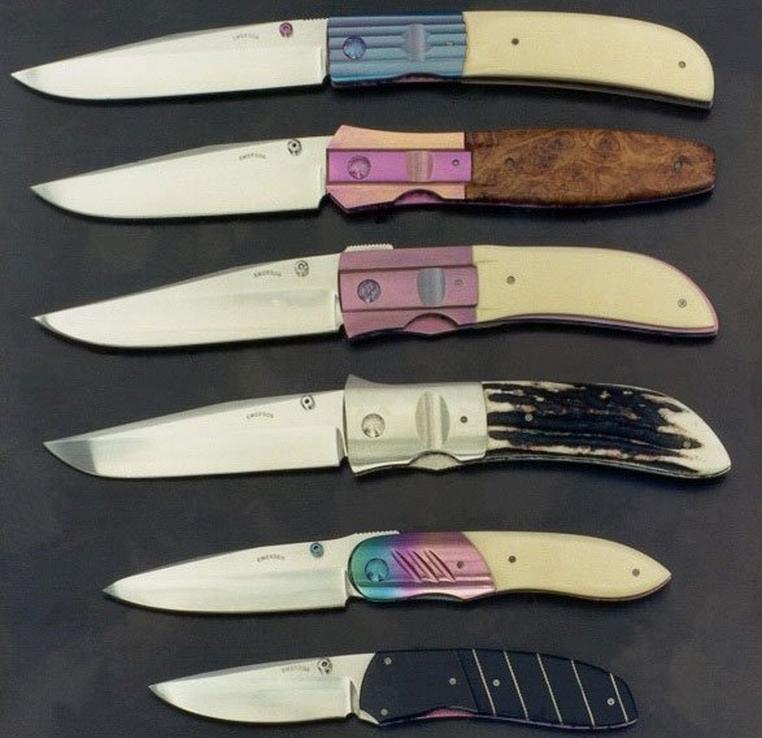Ernest Emerson: pioneer in tactical knives
Ernest Emerson is one of the pioneers in the field of tactical knives. His designs are used worldwide by special units. In addition to designs for brands such as Zero Tolerance and Kershaw, his own company Emerson Knives Inc makes top-quality knives.
How do you recognize an Emerson knife?
Emerson wave shaped feature
The most characteristic feature of Emerson’s pocket knives is the hook on the back of the blade called the wave shaped feature. A pocket knife with a wave opener can immediately be opened when you remove it from your pocket by pulling the knife back slightly. When you do the wave will be caught by the rim of your pocket after which the blade opens. According to most there is no faster way of opening a pocket knife. Emerson received a patent on this wave-opening method in 1998.
Not all pocket knives on the market that have the wave-opener are made in cooperation with Emerson. There are multiple pocket knives out there that can be opened using a very similar system, but that never mention Emerson’s name. Perhaps that is the best evidence that shows how great this function really is.
Excellent ergonomics for more comfort
When you hold one of Emerson’s designs it immediately feels right. The shape and the thickness of the handles, the curve of the finger grooves, and the ratio from the blade to the handle: they are all perfect. The knife immediately ‘fits’. These knives are made to be used.
When you hold one of Emerson’s designs it immediately feels right.
Single edge grind for better cutting performances
The knives made by Emerson knives all have a chisel grind. As such they cut better and are easier to be sharpened in the field. The single edge grind is a Emerson Knives characteristic which is why you won’t find this type of grind in knives Emerson designed in cooperation with other brands.
Emerson Knives Inc
In the nineties Emerson started making knives in his garage and, as you might imagine, the production capacity was very limited. For this reason Emerson decided to start his own production company: Emerson Knives Inc. The capacity increased and eventually people who really wanted to own an ‘Emerson’ could be helped sooner.
An aspect that truly characterizes Emerson’s entire career is that he was often asked to design knives for several (government) agencies. At the end of the nineties, for instance, NASA needed a pocket knife that could help the crew of the Space Shuttle. They asked Emerson to slightly adjust one of his existing tactical knives by adding a type of cutting hook in the tanto-tip. A hook that could specifically be used to open packs of astronaut food. This knife cannot be bought in stores and is merely made available for NASA. The people at NASA were so satisfied with Emerson’s results they used this knife during one of their many space trips.
Ernest R. Emerson: the man behind the knives
Ernest Emerson was born on March 7, 1955 in North-Wisconsin in the United States. As a young boy, at age 16, he started practicing Yudo, the Korean version of Judo. At age 17 he played baseball at a professional level, and started focusing on different forms of Karate (amongst others Kuokushinkai and Shotokan). In school he also worked hard and received his degrees in physical education and world history.
After finishing school Emerson moved to South-California to pay more attention to his love for martial arts. He became a martial arts instructor and worked as a technical engineer at an aircraft manufacturer where he was soon promoted and became a design engineer.
The first knife
As an 8 year old boy Emerson was gifted a pocket knife by his grandfather. His grandfather’s gift, Emerson believed, was what started his fascination for knives. Years later, in 1978, Emerson was asked to purchase a Balisong (a Butterfly knife) during a training in the Philippine martial arts. He, however, couldn’t afford one and decided to build one himself using a drill, metal saw and file. His fellow students (also unable to purchase an expensive Balisong) were so impressed he immediately received orders to make more. It was the start of a new career.
At the start of his career as a knife maker Emerson stood out because he used materials from the aviation industry such as titanium and carbon fibre, in addition to micarta, mother of pearl, and meteorite. Furthermore, he introduced the colourful anodised titanium bolsters. However, Emerson’s first designs looked more like gentleman’s knives than the tactical knives we know today.
From gentleman’s knives to tactical users
This turning point came in 1985 when Emerson noticed that during martial arts trainings the fighters only used dummies. However, when they left the ring they lacked a proper tactical pocket knife. Emerson took one of his ‘regular’ models and stripped it. The result was a knife with Micarta handles because they offer you great grip during wet circumstances and sand-blasted titanium bolsters. He called these new knives the Viper collection. Five knives, each with their own purpose. There was, for instance, a knife with a larger pommel giving its user more grip when you use it with wet hands. Perfect for marines.
In 1986 Emerson was impressed by the cutting properties of a knife with a single edge grind. So much so that he decided to use the same chisel grind in his knives. At the same time he got into contact with a couple of Navy SEALs for who he created a new version of the famous Viper-knives. The design which would, later on, become known as the CQC: Close Quarters Combat. In addition to the famous Navy SEALs members of the Armed Special Forces, the German GSG9 and the British SAS purchased this model.
In addition to the famous Navy SEALs members of the Armed Special Forces, the German GSG9 and the British SAS purchased this model.
In 1993 Emerson worked with knife producer Timberline Knives. Together they designed a fixed knife called SPECWAR, a knife designed to be used by the Navy SEALs. This knife won in 1995 the American Made Knife of the Year Award at the Blade Show in Atlanta, Georgia. The same year the SPECWAR was displayed in the Metropolitan Museum of Modern Art in New York.
In addition to making knives Emerson never lost sight of his martial arts as he trained many special teams. From Navy SEALs to the guards of the British parliament. In addition, he is the owner of the Black Shamrock Combat Academy Gym located in Los Angeles and was added to the Martial Arts Hall of Fame, next to big names such as Chuck Norris and Bruce Lee.
Emerson trained multiple special teams. From navy SEALs to the guards of the British parliament.
Ever since Emerson started producing his own knives in the nineties he continuously tries to improve his designs and the production process. In addition, he occasionally produces custom pocket knives that are sold via a lottery, simply because they are in high demand. Winning this lottery doesn’t mean you win the knife, it simply means you have won the opportunity to purchase a knife for a couple thousand dollars.





?%24center=center&%24poi=poi&%24product-image%24=&fmt=auto&h=500&poi=%7B%24this.metadata.pointOfInterest.x%7D%2C%7B%24this.metadata.pointOfInterest.y%7D%2C%7B%24this.metadata.pointOfInterest.w%7D%2C%7B%24this.metadata.pointOfInterest.h%7D&scaleFit=%7B%28%24this.metadata.pointOfInterest%29%3F%24poi%3A%24center%7D&sm=c&w=1208)




